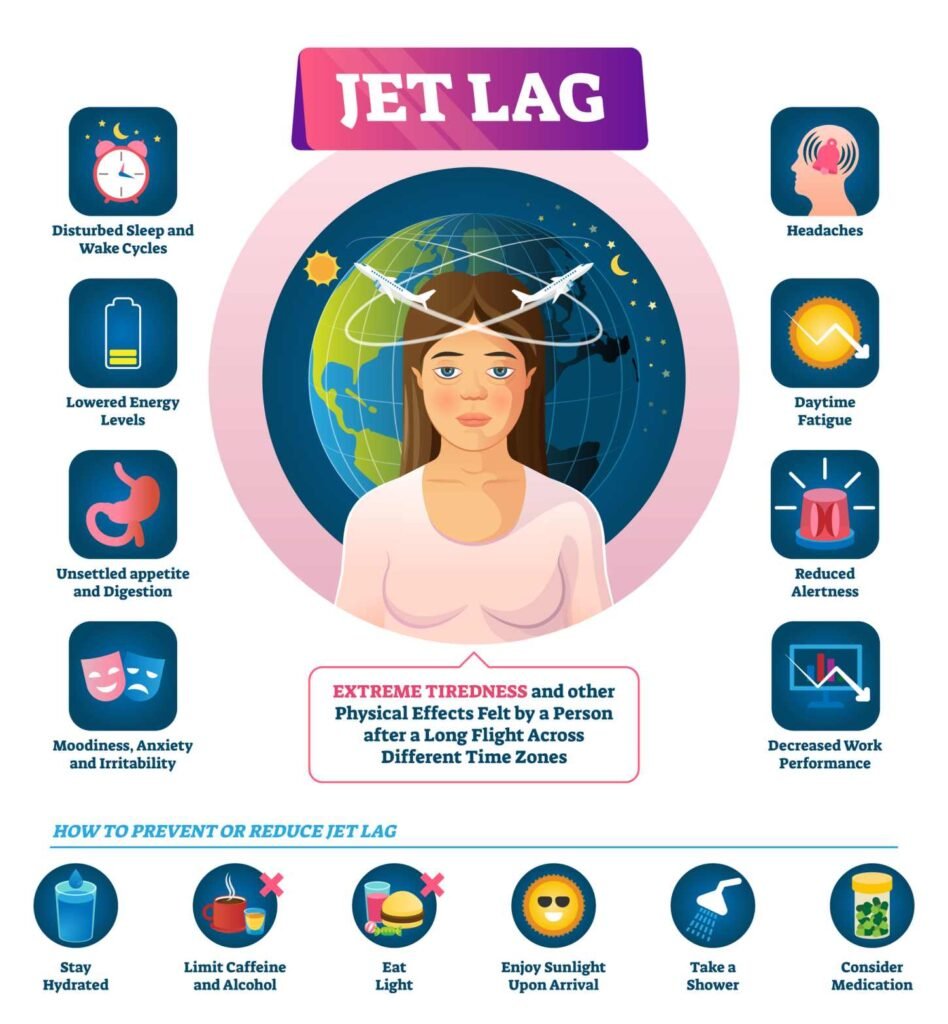Desynchronosis, commonly known as jet lag, is a temporary sleep disorder that affects individuals who travel across multiple time zones.
Desynchronosis occurs when the body’s internal clock, also known as the circadian rhythm, is out of sync with the external environment. The circadian rhythm is a natural biological process that regulates the body’s sleep-wake cycle, hormone production, and other physiological functions.
When individuals travel across time zones, their circadian rhythm is disrupted, causing a range of symptoms that can include fatigue, insomnia, irritability, and difficulty concentrating. The severity of jet lag symptoms can vary depending on the number of time zones crossed, the direction of travel, and the individual’s age, health, and sleep habits. While jet lag is not a serious medical condition, it can significantly impact an individual’s productivity, mood, and overall well-being.
The effects of jet lag can last for several days, but there are several strategies that can help individuals adjust more quickly to the new time zone. These strategies include exposure to natural sunlight, staying hydrated, avoiding alcohol and caffeine, and adjusting sleep schedules before and after travel. With proper preparation and care, individuals can minimize the impact of jet lag and enjoy their travels without the disruption of desynchronosis.

Understanding Desynchronosis
Definition and Causes
Desynchronosis, also known as jet lag, is a temporary sleep disorder that occurs when the body’s internal clock (circadian rhythms) is disrupted due to traveling across time zones. This disruption can cause a mismatch between the body’s natural sleep-wake cycle and the local time at the destination.
The body clock, which is located in the suprachiasmatic nucleus (SCN) of the brain, regulates various physiological processes such as sleep, hormone secretion, and body temperature. It is reset by exposure to light and dark cycles, which help to synchronize the body’s internal clock with the external environment.
Jet lag occurs when the body clock is not able to adjust to the new time zone quickly enough, leading to symptoms such as fatigue, insomnia, irritability, and digestive problems. The severity of jet lag depends on several factors, including the number of time zones crossed, the direction of travel, and individual differences in circadian rhythms.
Effects on Circadian Rhythms
Jet lag can disrupt the body’s circadian rhythms, which can have negative effects on health and well-being. For example, studies have shown that jet lag can increase the risk of accidents, impair cognitive function, and disrupt hormone regulation. It can also exacerbate existing health conditions such as diabetes, heart disease, and depression.
To minimize the effects of jet lag, it is recommended to gradually adjust to the new time zone before traveling, stay hydrated, and avoid alcohol and caffeine. Exposure to natural light and exercise can also help to reset the body clock and alleviate symptoms of jet lag.
In summary, desynchronosis or jet lag is a temporary sleep disorder that occurs due to disruption of the body’s internal clock when traveling across time zones. It can lead to a mismatch between the body’s natural sleep-wake cycle and the local time at the destination, causing symptoms such as fatigue, insomnia, and digestive problems. Minimizing the effects of jet lag requires adjusting to the new time zone gradually, staying hydrated, and avoiding alcohol and caffeine.
Symptoms and Health Impacts
Desynchronosis, also known as jet lag, can have a range of physical, cognitive, and emotional effects on individuals. The severity and duration of these symptoms can vary depending on the number of time zones crossed and the direction of travel.
Physical Symptoms
Jet lag can cause a range of physical symptoms, including fatigue, headaches, nausea, and digestive problems. Individuals may also experience disrupted sleep patterns, with difficulty falling asleep or staying asleep. These symptoms can impact an individual’s ability to function and perform daily tasks.
Cognitive and Emotional Effects
In addition to physical symptoms, jet lag can also have cognitive and emotional effects. Individuals may experience difficulty concentrating, memory problems, and mood changes such as irritability and depression. These effects can impact an individual’s work performance and personal relationships.
Long-Term Health Concerns
While jet lag is typically a temporary condition, there are some long-term health concerns associated with frequent travel across time zones. Studies have shown that frequent jet lag can disrupt the body’s circadian rhythm, which can lead to a range of health problems such as obesity, diabetes, and cardiovascular disease.
Overall, it is important for individuals to take steps to minimize the impact of jet lag, such as adjusting sleep schedules before travel, staying hydrated, and avoiding alcohol and caffeine. By taking these steps, individuals can reduce the severity and duration of symptoms and minimize the risk of long-term health concerns.
Prevention and Management Strategies
Before Travel
Before traveling, individuals can take several steps to minimize the risk of desynchronosis. It is recommended to gradually shift sleep schedules to match the destination time zone. This can be done by adjusting sleep and wake times by 15-30 minutes each day in the days leading up to the trip. It is also important to maintain a regular sleep routine and get adequate rest before the trip.
Hydration and diet can also play a role in preventing desynchronosis. It is recommended to stay hydrated by drinking plenty of water and avoiding alcohol and caffeine, which can disrupt sleep. Eating a balanced diet and avoiding heavy meals before bedtime can also help regulate sleep.
During Travel
During travel, it is important to continue to prioritize hydration and rest. Individuals should try to stay hydrated by drinking water regularly and avoiding alcohol and caffeine. Resting during long flights or car rides can also help reduce fatigue and promote alertness upon arrival.
Light exposure can also be used to help adjust to the new time zone. Exposure to bright light during the day and avoiding bright light at night can help reset the body’s internal clock. This can be done by spending time outside during the day or using light therapy devices.
Post-Travel Adjustment
After arriving at the destination, individuals can take steps to adjust to the new time zone. It is important to maintain a regular sleep schedule and avoid napping during the day. Melatonin supplements can also be used to help regulate sleep, but should be used under the guidance of a healthcare professional.
Establishing a routine and engaging in regular physical activity can also help promote healthy sleep patterns and reduce the risk of desynchronosis. It is also important to continue to prioritize hydration and a balanced diet to support overall health and well-being.
Scientific and Medical Insights
Chronobiology Research
Desynchronosis, also known as jet lag, is a circadian rhythm sleep disorder that occurs when an individual travels across multiple time zones. The suprachiasmatic nucleus (SCN) in the brain is responsible for regulating the body’s circadian rhythm, which is disrupted during travel. Research in chronobiology has shown that the SCN can adjust to a new time zone at a rate of approximately one hour per day. This adjustment can be influenced by factors such as light exposure, melatonin secretion, and gene regulation.
Treatment and Therapies
There are several treatment options available for desynchronosis, including light therapy and melatonin supplements. Light therapy involves exposure to bright light at specific times of the day to help reset the body’s circadian rhythm. Melatonin is a hormone that is naturally produced by the body to regulate sleep-wake cycles. Supplemental melatonin can be taken to help regulate sleep patterns during travel.
Studies have shown that both light therapy and melatonin supplements can be effective in reducing the symptoms of desynchronosis. However, it is important to note that these treatments may not work for everyone and should be used under the guidance of a medical professional.
In conclusion, desynchronosis is a common sleep disorder that can be disruptive to an individual’s daily routine. Through ongoing research in chronobiology, treatment options such as light therapy and melatonin supplements have been developed to help alleviate the symptoms of desynchronosis. It is important for individuals to consult with a medical professional to determine the best course of treatment for their specific needs.
10-3-2-1-0 Sleep Rule: A Simple Guide to Better Sleep

The 10-3-2-1-0 sleep rule is designed to help individuals maintaining a regular sleep schedule that promotes restful and restorative sleep. By following this rule, individuals can create a relaxing environment that signals to the body that it is time to sleep.
Continue reading about the: 10-3-2-1-0 Sleep Rule
MaryRuth Organics Sleep Gummies Without Melatonin Review: Do They Work?

These gummies are designed to promote relaxation and support sleep quality for adults. Unlike many other sleep aids, they don’t contain melatonin, so you won’t wake up feeling groggy or drowsy.
Continue reading: MaryRuth Organics Sleep Gummies Without Melatonin




